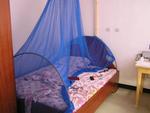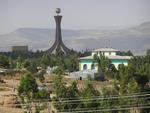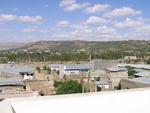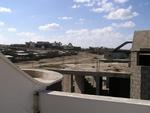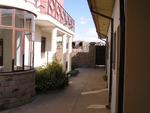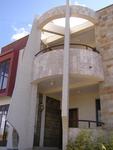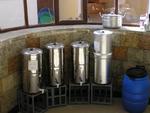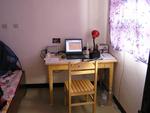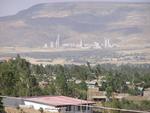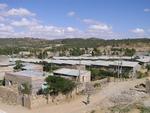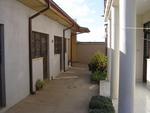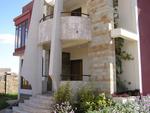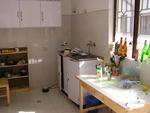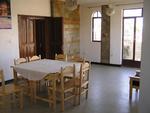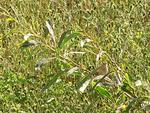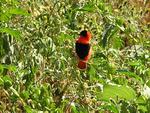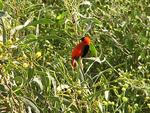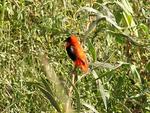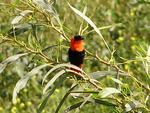Fortunately I have been able to speak to my parents since I last wrote, and my dad
is out of hospital. I think that my next holiday will be a trip to New Zealand, it
has been a long time since I was there last anyway.
There have been a number of relatively minor things go missing from MIT. The students
have had some things like shoes stolen from the dormitories. One of the members of staff
was requested to invetigate the disappearences. It turns out that they were stolen
by one of the 'day labourers' that are currently cutting the grass. They were uncovered
as the thief when they came to work wearing the stolen shoes. Not really the smartest
of moves.
As mentioned previously, I am now living in Ferenji Heights. This is my name for the
large house rented by MIT for four of the new VSOs and myself. It is a nice
building, having been recently rennovated. Prior to our moving in, it had been rented
for twice the price to some members of the Ethiopian army. They caused a lot of damage,
including writing on the walls. This is why everything appears to be new here. There
is even, and this is very unusual, a bath. I'm sticking to cold showers at the moment
though because the bath is in the 'master bedroom', and also it doesn't feel very
VSO to have a bath.
You can picture the building as a villa, with two floors and a flat roof that is accessible
and quite nice to sit on (or go and have a smoke if you are a nicotine addict). Surrounding the
house is a stone wall varying in height from one metre to two, and with iron bars reaching up to
a total of about three metres. This encloses a compound with a small garden area and
space for three external rooms, shower and toilet, as well as the house itself. Inside the
house is a large lounge, dining room, kitchen, three purpose built bedrooms and two small
rooms without fitted wardrobes that we are using as bed rooms. Everything inside is pretty
nice although the usual lack of attention to detail or understanding is there. For instance, some
of the doors have the 'ratchet', the part that holds the door closed when it is not locked,
put in round the wrong way so that the door just opens when pushed. Another source of amusment
was the tapes left on the sinks that proudly claimed that this was the company for
all of your 'sanitary wores'. I assume that the second word just needs a vowel changing and not
a letter adding.
One habesha currently lives within the compound, in one of the external rooms. He is Teklay,
brother of the owner of the house. He is hanging around kind of as a handy man, although he
is none too handy, having caused a power cut by a misplaced screwdriver. Although he is a really
nice guy, he can hang around a little too much and you have to be quite rude to get him to
leave you alone. It is easier now that the other VSOs are here, I can normally avoid him.
One of the new volunteers has already been in Ethiopia for a year so her Amharic is
much better than mine, although if Teklay is having a problem communicating with one of the
other VSOs (he has quite good English but it can be quite difficult), we normally work it out
with a mix of English, Amharic, Tigrinian, and sign language. My amharic has got much better
since having to talk to Teklay, and there is a bit of friendly rivalry between myself and the
other VSO that has been in Ethiopia, and that is improving both of our Amharic and Tigrinian.
There was one night before the other VSOs arrived that I found particularly frustrating. I
hadn't been very well - my stomach had been playing host to the Giardia world cup by the
feel of things. On one night, when all I wanted to do was use the toilet, Teklay was trying
to stop water leaking from the cistern into the bowl after it had been flushed. The top of
the cistern was off and he would repeatedly turn the arrangement inside the cistern round
and round. At first I thought that there was a screw thread. However, it didn't matter
how many times he turned it, it got no tighter. Everytime he found a position that stopped
the water, it would continue running after he tested a flush. This process continued
for an hour and a quarter. Teklay just couldn't seem to understand that no matter how many
times he turned the thing, it was not going to suddenly work. It wasn't as if he was turning
it gradually. There would be five strong turns followed by a check for the amount of water.
Unfortunately I had been roped in to help and I couldn't get away. But it did help me to
improve my Amharic and Tigrinian.
Although I have described the house, I haven't yet described the new volunteers. There are
five new volunteers working at MIT. The students have been looking forward to meeting the
new Ferenj, although there was a surprise in the fact that one of them is Kenyan, so
not what they would automatically expect from a VSO. Dr. Mulu and I went out to the airport to
meet them. However, the plane was delayed so we went into town, ate food at his house, and then
returned just in time because the plane passed us as we drove to the airport. We met all of
volunteers, and Seamus (VSO in Maichow) who had returned to Tigray with them. I had
previously arranged to allow Robert, one of the new MIT instructors, into his house. As usual
this was quite a long winded process, and took quite a lot of the afternoon while the
other four new MIT VSOs moved into the big house. Robert will be teaching physics
(actually more electronics it turns out) and has a house on the other side of town
that is convenient for the town and one of the MIT vehicles passes his house so it is
quite easy for him to get in.
The other volunteers are Hans (Mathematics), Alison (English), Jon (Electronics), and
Ray (Computing). The nationalities and backgrounds are quite varied with Hans coming
from Holland and Ray coming from Kenya. Ray has been a volunteer before in another part
of Ethiopia. That placement did not work very well so she decided to change placements
and so that is how she is at MIT. All of the volunteers were surprised and pleased with
the house, in particular Ray. She spent about half an hour catching flies with her
open mouth. There is an interesting mix of personalities, and I am currently negotiating
the television rights for the VSO House with Channel 4. Surely Big Brother is
getting boring? Can you not hear the BB announcer - 'Today, Hans found a scorpion in his
cornflakes...'
It is interesting talking to Ray because her experience of VSO is very different to mine.
Simply because she is Kenyan, the habesha do not realise that she is not habesha, although
they can see differences in her face, they do not assume 'ferenj' foreign. This has both
advantages and disadvantages. It does mean that she is able to walk on her own without the
hassle that we get as white Ferenj. However, when she walks with one of us, she can get
much nastier hassle. They assume is that as a black woman, walking with a white man, then
she must be a bar girl (prostitute).
Recently we had a holiday to celebrate the 'finding of the cross'. It was very good timing
for the new volunteers because immediately they were able to see some of the culture
of Ethiopia. Fire plays a big part of the celebration, and at night hundreds of people
walk up a nearby hill on a specially built winding path carrying torches. A giant snake of light
can be seen from Mekelle. We had a particularly good view from our roof top.
Another feature of the period is the Meskel bird. This appears to be the bird's mating season
and its presumably the male that has a brilliant flash of orange on it. Once the mating
period is over the brilliant colouring disappears. Alison pointed out that these birds
think that they are lighter than they really are. When they fly, they start of quite well,
but end up bobbing up and down as they seem to struggle under their own weight, before
giving up and landing on the nearest tree or bush. I have only ever seen these birds
in one place (on campus) and have managed to get some photos with the good camera.
More Ferenj at MIT has had some very big advantages for me in terms of the curriculum
discussions. We have had two recently, and two in which things have moved forward substantially.
Previously, it was me arguing against what the Indian professors had said. I deliberately let
the new VSOs make up their own minds about the curriculum before the first meeting. It was
gratifying to see them pick out most of the problems I had found previously. And, although the
argument had not changed, there were now more voices on my side pushing for improvements,
than those wanting to hold things back. I think the new VSOs are starting to now realise the
size of the task ahead of all of us now. There is a lot to do, and not many staff to do it.
Today, we also had a visit from the pre-accreditors - people from Mekelle University who are
trying to assess whether MIT is allowed to award degrees. There were many criteria such as
the number of square metres of campus per student, the library must have at least 5000
books and 100 titles, etc. What I found interesting was that all of the measurements
where quantitative, there were no qualitative. So, for instance, there was nothing
about the quality of teaching or the relevance of courses. Obviously, these are not as easy
to measure, and most of the criteria did seem reasonable.
